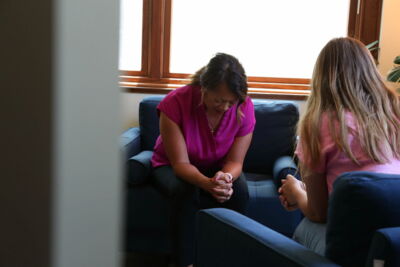
Messages of Grace, Mercy and Compassion
Story: Danielle Luebbe
Photos: Hope Rickords '21
Concordia University, Nebraska’s counseling office uses faith and God’s work to help them minister to students’ mental well-being.
Mental health counselors are pivotal in promoting the overall well-being of students at universities like Concordia University, Nebraska. Their work addresses immediate mental health concerns, support for common issues such as anxiety, depression, stress and relationship problems and can ultimately contribute to students' long-term personal and academic success.
“Mental health counselors offer a safe and confidential space for students to express their thoughts, feelings and concerns,” says Kathy (Gabrillo) L’Heureux ’97, Director of Counseling Services. “Early intervention and ongoing support can significantly improve students' mental health outcomes.”
Chief Operating Officer Kim Boyce started his journey at Concordia Nebraska as a professor of practice of psychology and also served as a part-time counselor in the Counseling Center.
“Often times for college-aged students, this is the first time in their lives they have really begun to consider who they are, what their life purpose is and where they are headed in life,” he says. “Many students in the current generation (Generation Z) suffer from negative symptoms in a large part due to a lack of a sense of identity.”
Christian counselors in particular have the opportunity to integrate faith and bring comfort through God’s word.
“Christian counseling means that all understanding of the human psychological and emotional experience is viewed through a Biblical lens,” says Boyce. “The Bible is the authority in how we approach life's difficulties and problems, and even how we view and approach our sense of self. The questions of who we are, why we are here, where is our life headed and what is the meaning of our lives is found in God's Word.”

“Delivering the message of grace, mercy and compassion is woven into my counseling sessions to promote forgiveness and healing as I guide students in addressing issues of guilt, shame and past hurts,” agrees L'Heureux. “It is important to me to help students draw strength and resilience from their faith during difficult times.”
Another way counselors support students on campus is by working with the Care Team. The Care Team assists and ministers to students who have been identified by faculty or staff as experiencing difficulty academically, socially, emotionally, physically or spiritually by informally attempting to connect them with key individuals and resources.
The questions of who we are, why we are here, where is our life headed and what is the meaning of our lives is found in God's Word.
Many initial contacts with students begin because a faculty member, coach or RA connects the student to the counseling office. Faculty and staff can also refer students to the on-campus Care Team if they notice a decline in academic performance, that they are disengaged or display atypical behavior.
“With a signed release from the student, counselors can coordinate support with professors they are connected with as well as the health office and Academic Resource Center,” says L'Heureux. “Our Care Team, which serves as a multidisciplinary team, meets weekly and reviews students who have been referred, and we determine as a team who will be connecting with those students to provide support.”
Counselors assist students with a wide range of issues, including anxiety, depression, trauma, eating disorders, substance abuse and more.
“We work with students to develop coping strategies, resilience and emotional regulation skills,” says L’Heureux. “By addressing underlying issues and providing tools for self-care and stress management, counselors promote emotional well-being among students.”
In addition to therapeutic services, such as short-term and group counseling and assisting during personal crises and emergencies, Concordia’s counseling center can also help students find community-based mental health services and offers brief, confidential consultations called Let’s Talk. Let’s Talk is a free drop-in service, and no appointment is needed.
“By fostering a culture of mental health awareness and acceptance, counselors contribute to a more supportive community on campus,” says L'Heureux. “Through addressing mental health concerns and providing strategies for self-care, time management and academic stress management, we can also support students in achieving their academic and personal goals.”

Common Mental Health Issues
Kathy L’Heureux, Director of Counseling Services at Concordia University, Nebraska, shared the most common issues she sees in students at Concordia.
Academic Pressure
Balancing coursework, exams, assignments and deadlines can be overwhelming for students, especially when taking multiple challenging courses simultaneously.
Time Management
Many students struggle with managing their time effectively, leading to procrastination, stress and difficulty prioritizing tasks. I see many athletes who are trying to find the balance, as the demands of being a student-athlete are challenging.
Financial Strain
Tuition fees, living expenses, textbooks and other costs can create financial stress for students, impacting their ability to focus on academics and participate in extracurricular activities. This is especially true for those who are navigating college expenses on their own without family support.
Mental Health Issues
Many students may experience anxiety, depression, stress or other mental health concerns due to academic pressure, social challenges, homesickness, trauma or personal issues.
Social Adjustment
Transitioning to college life can be challenging for students, especially if they are away from home for the first time. Building new friendships, navigating social dynamics and adjusting to a new environment can be daunting.
Homesickness
Some students experience homesickness and feelings of isolation, particularly if they are studying in a different city or country from their family and support network. Saying “goodbye” to what life was like in high school and acclimating to a new life of independence and being away from home is a big change that is difficult for some.
Peer Pressure
Some students may feel peer pressure to engage in unhealthy behaviors, such as excessive partying, substance use or risky activities, which can influence students' well-being and academic performance.
Cultural Adjustment
International students may face challenges related to cultural differences, language barriers, discrimination and adapting to a new educational system.
Career and Future Uncertainty
Students may feel pressure to choose a major, plan their career path and make decisions about their future, leading to anxiety and uncertainty about their academic and professional goals. As seniors approach graduation there is an increase in anxiety as they prepare to enter the workforce and not knowing what that may look like can be scary.
Work Life Balance
We have many students who are balancing academics and some athletics too, with part-time jobs, internships, volunteering, extracurricular activities and personal responsibilities that can be challenging for students, leading to stress and burnout.